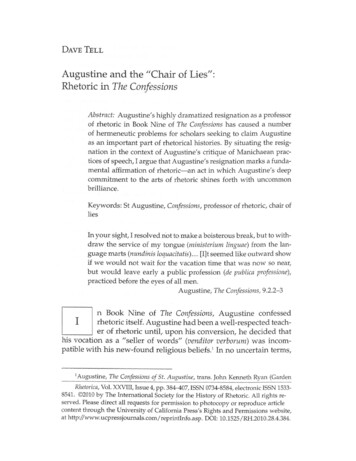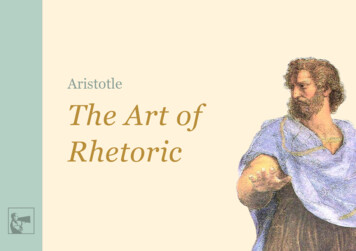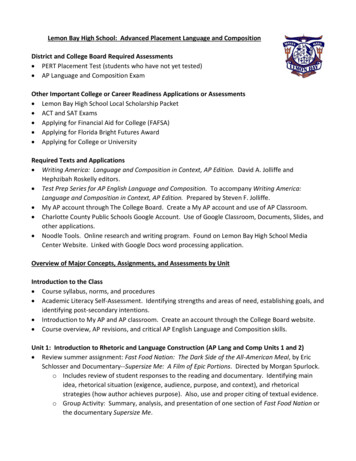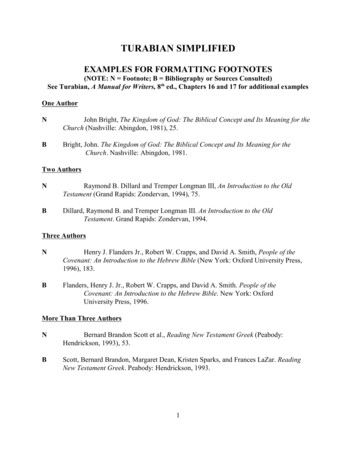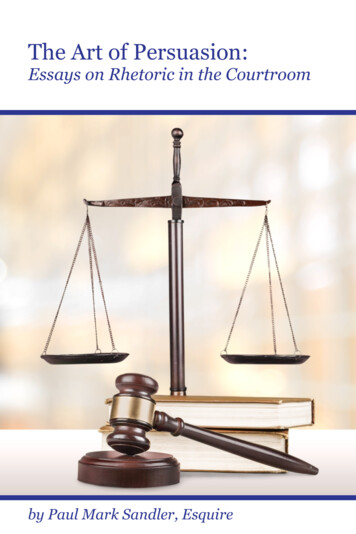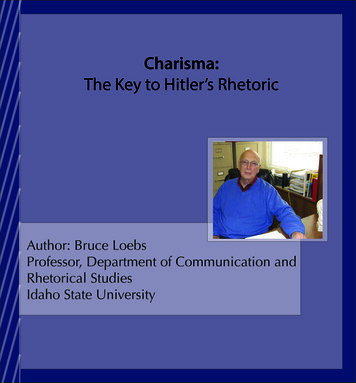
Transcription
Charisma:The Key to Hitler’s RhetoricAuthor: Bruce LoebsProfessor, Department of Communication andRhetorical StudiesIdaho State University
World War Two is the most cataclysmic event in history. According to Britishmilitary historian John Keegan, “The Second World War is the largest single eventin human history, fought across six of the world’s seven continents and all of itsoceans. It killed 50 million human beings, left hundreds of millions of otherswounded and materially devastated much of the heartland of civilization.”1Incredibly, one man – Adolf Hitler – caused this “carnage and ruin.”2 Notedhistorian John Lukacs, in his insightful analysis of The Legacy of the Second WorldWar, draws the cause and effect of Hitler and WWII succinctly, “No Hitler, noSecond World War. The Second World War was Hitler’s war.”3My purpose in this essay is to describe Hitler’s unquestionedskill as a public speaker by explaining how he projected himselfas a charismatic w2/photosIt is horrifying to contemplate the consequences of a German victory in WWII. Lukacsbelieves Hitler could have won. “Had the Germans invaded England during the summer [of1940] he would have won his war.” Adds Lukacs, “in September and October 1941 Stalinwas compelled to inform Churchill ‘the Soviet Union [is] in mortal danger’, on the verge ofcollapse.”4 H. Trevor Roper, premier historian of Hitler and Nazi Germany, agrees: “The factis Hitler nearly won the war. It was by a whisker he didn’t. I think there were three of fourmoments when he really could have won it.”5 Defeating Hitler was arduous. Explains Lukacs,“It took almost six years for the greatest powers of the world to defeat him. It took an alliance ofAmerica, Russia, and the British Empire to defeat [Nazi Germany]. No one or even two of themsufficed to conquer Hitler’s Germany. Perhaps as many as five hundred million people ranged against a Germanyof 80 ary/ww2/photosHitler’s place in history is fixed as one of the humanity’s most influential andmost evil figures. A proper epitaph for him is: Because Hitler lived millions died.British historian Ian Kershaw, one of Hitler’s main biographers, writes, “certainlyno other individual has stamped a more profound imprint [on the 20th century]than Adolf Hitler. The 12 years of Hitler’s rule permanently changed Germany,Europe and the world. He is one of the few individuals of whom it can be said withabsolute certainty, without him the course of history would be different.”7Hitler’s prodigious impact is widely acknowledged. In 2000, to commemoratethe passing century, 1,200 historians at U.S. colleges ranked Hitler first as the individual “with the most significantimpact on 20th century life.”8 Because 2000 also began a new millennium Arts and Entertainment polled 360journalists, scholars, and political leaders to rank the people who “had done the most to shape our world in thepast 1000 years.” Hitler was placed sixteenth, the highest of any world leader. His great contemporaries were farbehind: Churchill (52), Roosevelt (60), and Stalin 2/photosRelevant Rhetoric Vol. 4 2013 Charisma: the Key to Hitler’s Rhetoric2
Hitler’s foremost enemy Joseph Stalin once acknowledged, “Hitler is a genius.”10 Tragicallyhe was an evil genius – perhaps history’s ultimate villain. TIME, in its “Person of the Century”issue, writes, “Hitler redefined the meaning of evil forever.”11 Oxford historian Alan Bullock,author of two biographies of Hitler, observes, “if Hitler isn’t evil then the word has nomeaning.”12 Ron Rosenbaum of Columbia University, paraphrasing Emil Fackenheim (whoRosenbaum describes as “the preeminent theologian of the holocaust”) attempts to fix Hitler’sevil in an understandable context: “You cannot locate Hitler on the ordinary continuum ofhuman nature. You cannot merely say he was a very, very, very bad man, perhaps the mostwicked yet, but still explicable as the same product of the same human nature, the samepsychological forces that produced, say, the next worst human being and the next and the next until we reachourselves. No – Hitler is off the charts – off the grid – in another category of radical evil entirely.”13Hitler’s slaughter of 21 million noncombatants ranks him behind only Stalin’s43 million and Mao’s 38 million as history’s supreme killer, according to theEncyclopedia of Genocide.14 Although Stalin’s atrocity is, writes Bullock, “double thenumber put to death by the Nazis” 15 Hitler’s crime seems greater. Robert Conquest,historian of the German – Russian War, explains: “If forced to make a comparisonbetween the two I’d have to say, however hesitatingly and subjectively, that Hitler’sdegree of evil ‘just feels worse’ than Stalin’s.” 16Hitler as a Charismatic LeaderHitler once declared, “everything I have accomplished resulted from persuasion.” Rhetoric was the key toHitler’s success. Charisma was the key to Hitler’s rhetoric. I will describe several topics relevant to his ethos,illustrate Hitler’s acknowledged skill as an orator, and, using German sociologist/economist Max Weber’s definitionand description of charisma, focus on four main characteristics of “the Hitler Myth”: Hitler as a man of convictionHitler as a successful leaderHitler as a man of destinyHitler as Christ’s discipleAlthough more has been written about him than any individual Hitler remains an enigma. After researchingand writing two biographies on Hitler, Bullock concedes, “I can’t explain Hitler. I don’t believe anybody can.” 17Yehuda Bauer, holocaust historian at Hebrew University, acknowledges, “Hitler is explicable in principal, but thatdoes not mean that he has been explained.” 18 Fackenheim concurs: “There will never be an adequate explanation.Nothing can make Hitler explicable.” 19Even people who worked closely with Hitler admit their inability to understand him. Christa Schroder,Hitler’s private secretary for 15 years, declares, “I never ceased trying to make sense of the man I thought I knew.In the end it was impossible to discover Hitler’s true face. He had too many faces. There was no one Hitler.” 20Otto Dietrich, Hitler’s press secretary for 12 years, describes the Hitler dichotomy: “In Hitler’s soul, sincere warmthRelevant Rhetoric Vol. 4 2013 Charisma: the Key to Hitler’s Rhetoric3
and heartlessness, love of his fellow creatures and ruthless harshness dwelt side by side. I haveseen him as a kindly person, the enthusiastic patron of artists, affectionate toward children,always considerate of his guests, and gallant toward women, sympathizing with the sufferingsand sharing the joys of others. But there raged in that same person the primitive forces ofinhumanity. His decisions were based on utter mercilessness.” 2190% were “Hitler supporters, Fuhrer believers”Hitler’s rise to power was meteoric. In 12 years he built the National Socialist GermanWorkers Party (Nazi) from a mere seven members in 1919 to the largest political party inGermany in 1932 when the Nazis won more than one-third of the seats in the Reichstag bycompeting against six established political parties in free parliamentary elections. Explains Kershaw, “Hitler wasno tyrant imposed on Germany. Though he never received majority support in free elections [no party achieveda majority during the Wiemar Republic] he was legally appointed to power as Reich Chancellor just like hispredecessors had been, and became between 1933 and 1940 arguably the most popular head of state in the world.”Adds Kershaw, “it has been suggested that at the peak of hispopularity nine Germans in ten were ‘Hitler-supporters’,‘Fuhrer believers’. ” ng the Hitler enigma is the fact that Hitler’spopular support came from millions of voters who were,according to Lukacs, “then perhaps the most educatedpeople in the world.” 23 , Germany was “a society,” explainsRosenbaum, “widely regarded as the most civilized, inthe sense of ‘learned’ or ‘cultured’ and philosophicallysophisticated.” 24 Elie Wiesel, holocaust survivor, NobelPeace laureate, and professor of humanities at BostonUniversity asks rhetorically, “How did this Austrian withouttitle or position manage to get himself elected head of aGerman nation renowned for its civilizing mission? How to explain the success of his cheap demagogy in theheart of a people so proud of having inherited the genius of a Wolfgang von Goethe or an Immanuel Kant?” otosWas Hitler Insane?In addition to Hitler’s inexplicability and his popularity another factor essential for understanding Hitler’scharismatic leadership is his mental health. Was Hitler insane?Like all features of Hitler’s life his mental condition has been examined assiduously. Common opinion is thathe was a madman. How else to account for starting WWII, planning and prosecuting the holocaust, and,in his final days, ordering his munitions minster Albert Speer to destroy Germany and its people in a fieryGotterdammerung? Robert Waite, history professor at Williams College in his biography The Psychopathic God,Adolf Hitler describes many commonly held views of Hitler’s mental health including megalomania and paranoidschizophrenia. 26Relevant Rhetoric Vol. 4 2013 Charisma: the Key to Hitler’s Rhetoric4
Nasser Ghaemi is a professor of psychiatry at Tufts University andDirector of the Mood Disorders Program at Tufts Medical Center in Boston.In his 2011 book, A First Rate Madness: Uncovering the Links BetweenLeadership and Mental Illness Ghaemi describes Hitler as “outrageouslyinsane and abominably evil” who was afflicted with bipolar disorder (manicdepressive) and whose condition worsened after 1937 when “Hitler beganusing amphetamines.” Ghaemi believes that bipolar disorder can enhanceleadership and describes, as examples, General William Sherman, Lincoln,Churchill, Ghandi, Martin Luther King Jr., Franklin Roosevelt, John Kennedyand Hitler.Regarding Hitler, Ghaemi asserts, “up to 1937, I think, his moderatebipolar disorder influenced his political career for the better – fueling hischarisma, resilience, and political creativity. After that date, the harmfuleffects of daily intravenous amphetamine – to which he was especiallysusceptible because of his bipolar disorder – worsened his manic and depressive episodes, impairing his leadershipskills with catastrophic effects.” Concludes Ghaemi, “Hitler’s story supports the basic view of this book that mentalillness, especially in its mild to moderate forms, enhances crisis leadership.” 27Some Hitler scholars believe that calling Hitler insane trivializes and rationalizes the Hitler issue. Writingin the New Republic columnist Stanley Kaufman argues, “if Hitler is seen only as a drooling maniac at the head ofmillions of other drooling maniacs the enormity of what happened is slighted.” 28 Lukacs agrees: “Categorizinghim as mad, or even psychotic, absolves him of responsibility for what he did and ordered and said. It absolves usfrom thinking about him by sweeping the Hitler problem under the rug.” 29“I Have No Equal” as a SpeakerHitler’s personality may be inexplicable, his evil unfathomable, but his skill as an orator is unquestioned.Hitler was correct when he declared, “I have no equal in the art of persuading the masses.” Scholars of Hitler’scareer uniformly attest to his rhetorical prowess:Klaus Fisher: “Without his remarkable gift of persuasion Hitler would never have reached suchheights of power.” 30Trevor Roper: “Hitler, at the beginning, had only his voice. That was the sole instrument of his power.” 31Frederic Spotts: “Hitler’s speeches [were] the key to his rise to power.” 32Kershaw writes matter-of-factly, Hitler’s “rhetorical talent was, of course, recognized even by his politicalenemies.” 33Relevant Rhetoric Vol. 4 2013 Charisma: the Key to Hitler’s Rhetoric5
Rhetoric was the key to Hitler’s success. Ethos/charisma was the key to Hitler’s rhetoric.Aristotle describes ethos as one of three meansof persuasion, along with emotional appeal(pathos) and logical argument (logos). WritesAristotle, “the character of the speaker is a causeof persuasion when the speech is so uttered as tomake the speaker worthy of belief.” For Aristotle,“the speaker’s character [as perceived by theaudience] is the most potent of all the means ofpersuasion.” otosWeber’s Definition of CharismaGerman sociologist/economist Max Weber (1864-1920) emphasizesand expands the importance of ethos to persuasion in his tome Economyand Society by explaining the concept of charisma. According to Weber,charisma is one of the “three pure types of authority along with ‘rationalgrounds’ and ‘traditional grounds’.” For Weber charisma is a “certainquality of an individual personality by virtue of which he is consideredextraordinary and treated as endowed with supernatural, superhuman,or at least specifically exceptional powers or qualities.” Explains Weber,“these are such as are not accessible to the ordinary person, but areregarded as of divine origin or as exemplary, and on the basis of them theindividual concerned is treated as a ‘leader’ ”. 35Joseph Nyomarky, emeritus professor of political science at theUniversity of Southern California, explains Weber’s concept of charisma:“There has to be a measure of extraordinariness in the person of thecharismatic leader in order to evoke the enthusiasm and devotionnecessary for the establishment of charismatic authority.” 36 Ann Ruth Willner of the University of Kansas namesfour properties of charismatic leadership:“1. The leader is perceived by the followers as somehow superhuman.2. The followers blindly believe the leader’s statements.3. The followers unconditionally comply with the leader’s directives for action.4. The followers give the leader unqualified emotional commitment.” 37Relevant Rhetoric Vol. 4 2013 Charisma: the Key to Hitler’s Rhetoric6
Several assumptions underlie charismatic leadership. First, it is based on perception not necessarily onrealty. Weber explains, “what is alone important is how the individual is actually regarded by those subjectto charismatic authority, by his ‘followers’ or ‘disciples’. The validity of charismatic authority rests entirely onrecognition by the ruled, on ‘proof ’ before their eyes.” 38 Adds Willner, “it is not what the leader is but whatpeople see the leader as that counts in generating the charismatic relationship.” 39Secondly, charismatic rhetoric is amoral. Aristotle explains, “If it is urged thatan abuse of the rhetorical faculty can work great mischief, the same charge can bebrought against all good things (save virtue itself), and especially against the mostuseful things such as strength, health, wealth, and military skill. Rightly employed,they work the greatest blessings; wrongly employed they work the utmost harm.” 40Declares Willner, charismatic leadership is “inherently neither moral nor immoral,neither virtuous nor wicked. Such questions arise only when we wish to evaluatewhether a particular charismatic leader has used the relationship in the service of good or evil.” 41 Finally,because it rests in the eye of the beholder, charismatic leadership defies a standard profile. Nyomarky explainsthat confirmation to a “definable pattern of traits” is unnecessary for charismatic leadership.42Charismatic political leaders are rare. Few individuals are perceived to possess, according to the RandomHouse Unabridged Dictionary, “that special spiritual power or personal quality that gives an individual influenceor authority over large numbers of people.” 43 Hitler exemplified Weber’s charismatic leader.“Beloved by His People”In his TIME essay at the close of the century/millennium Eli Wiesellaments, “The fact is, Hitler was beloved by his people by the averageGerman who pledged to him an affection, a tenderness, and a fidelity thatbordered on the irrational. It was idolatry on national scale.” 44Kershaw agrees: “Underpinning Hitler’s unchallenged authority was theadulation of the masses. Large sections of the population simply idolizedhim.” 45 A.J.P Taylor concedes, “no dictatorship has been so ardently desiredor so firmly supported by so many people as Hitler’s was in Germany. Themost evil system of modern times was also the most popular.”46Because Hitler believed “the broad mass of the population needs an idol”he systematically constructed “the Hitler Myth.” In his perceptive study, TheHitler Myth: Image and Reality in the Third Reich, Kershaw writes, “Hitlerhimself paid the greatest attention to the building of his public image. He was evidently aware of how importanthis omnipotent image was to his leadership position. He transformed himself into a function – the function ofthe ary/ww2/photosRelevant Rhetoric Vol. 4 2013 Charisma: the Key to Hitler’s Rhetoric7
Anecdotal examples of the German people’s adulation of Hitler abound. A 17 year old girl declared, “theFuhrer is a great man, a genius, a person sent to us by heaven.” 48 A Berlin teacher remarked, “The entirethoughts and feelings of most Germans are dominated by the Fuhrer. He is the savior of a wicked, sad, Germanworld.” 49 CBS correspondent in Berlin William L. Shirer describes in his diary the reaction of Germans to Hitlerduring the 1934 Nuremburg Rally: “At about 10 o’clock tonight I got caught in a mob of about 10,000 hystericswho jammed the moat in front of Hitler’s hotel shouting ‘we wantour Fuhrer.’ They reminded me of the crazed expression I saw oncein the back country of Louisiana on the faces of some Holy Rollerswho were about to hit the trail. They looked up to him as if hewere a messiah, their faces transformed into something positivelyinhuman.” 50Six years later in December 1940, at the height of Hitler’spopularity following the defeat of France, Shirer acknowledges, “It isthe evil genius of Adolf Hitler that has aroused this basic feeling andgiven it tangible expression. Today, as far as the vast majority of hisfellow countrymen are concerned, he has reached a pinnacle neverbefore achieved by a German leader. He has become, even beforehis death, a legend, almost a god. To many Germans he is a figureremote, unreal, hardly human. For them he has become infallible.” 51Hitler’s charismatic appeal was not limited to the Germanpublic. Close associates also succumbed to his ethos. Hitler’ssecretary, Christa Schroder, writes in her memoirs, “He possesseda gift of a rare magnetic power to reach people, a sixth sense and a clairvoyant intuition. He could in somemysterious way foretell the subconscious reactions of the masses and in some inexplicable manner mesmerizehis audience.” 52 Erwin Rommel, Hitler’s greatest general who was involved in the 1944 plot to assassinate Hitler,wrote to his wife in 1943, “what power he radiates. What faith and confidence he inspires in his people.” 53 AlbertSpeer, Hitler’s architect and munitions minister asks rhetorically in his memoirs, “How is it possible that hecaptivated me so – and for more than a decade.” 54 Leni Reifenstahl, an award winning film director/producerand actress before Hitler came to power in 1933, recalls hearing Hitler speak for the first time in 1932: “It seemedas if the earth’s surface was spreading out in front of me, like a hemisphere that suddenly splits apart in themiddle, spewing out an enormous jet of water so powerful that it shook the earth. I felt quite paralyzed.” 55 Afterthis experience Reifenstahl wrote to Hitler offering to produce movies for the Third 2/photosSuccess Vital to Charisma“The Hitler Myth” portrayed a leader who possessed numerous charismatic characteristics including:courage, intelligence, goodwill, aloofness, benevolence, asceticism, even sex appeal. Most importantly “the HitlerMyth” projected Hitler’s “exceptional, supernatural, and extraordinary powers” by emphasizing his success andstrength of character. He was perceived by millions of Germans to be providential – even messianic.Relevant Rhetoric Vol. 4 2013 Charisma: the Key to Hitler’s Rhetoric8
Weber believes success iscrucial for charismatic leadership:“If proof of success eludes the leaderfor long, if he appears deserted byhis god or his magical or heroicpowers, above all, if his leadershipfails to benefit his followers, it is likelythat his charismatic authority willdisappear. Failure, certainly a chainof failures, means a fatal underminingof charisma. Charismatic leadershipcannot survive lack of success.” 56Hitler’s early success as Chancelloris undisputed. After defeat in WWIGermany was compelled by theallies to sign the punitive Treaty ofVersailles, described by WinstonChurchill as “malignant” and “insane”, “a sad story of complicated idiocy.” Churchill writes, “Germany wascondemned to pay reparations on a fabulous scale.” otosAfter the Great War Germany sank into a severe economic depression. According to Bullock, Germany had“a higher unemployment rate percentage than any of the other industrialized countries.” 59 Kershaw explains,“close to half of the work force was either fully or partially unemployed.” 60 Inflation was rampant. In 1923the German mark – pound sterling rate was, writes Churchill, “43 million millions to the pound sterling” 61 ,roughly an incredible 130 million dollars to one German mark. In 1933 Hitler initiated huge public works andrearmament projects. By 1936, writes Kershaw, “unemployment was practically wiped out. Living standards werebeginning to improve. More consumer goods were becoming more available these were the good times. In amere three years Hitler appeared to have rescued Germany.” 62Before coming to power Hitler called Germany “a groveling nation of beggars.” He vowed to “tear to piecesthe ‘diktat’ of Versailles” and restore German pride and honor. Waite says he succeeded: “In a series of brilliantand bloodless coups he created a triumphant greater Germany proudand strong. He remilitarized the Rhineland and annexed Austria andCzechoslovakia.” 63 The nation cheered their Fuhrer’s successes. PeterFritzsche of the University of Illinois writes that after Germany’sannexation of Austria in March 1938, “Hitler’s popularity reachednew heights.” 64 When Hitler faced down the British and French inCzechoslovakia in October 1938 Kershaw believes Hitler’s charismareached “a new dimension of legendary infallibility” exceeded onlyin June 1940 when the defeat of France “raised Hitler’s standing tounsurpassed heights.” 66Relevant Rhetoric Vol. 4 2013 Charisma: the Key to Hitler’s Rhetoric9
Germans were not alone in lauding Hitler. One of his strongest admirers wasWinston Churchill. In 1936 Churchill writes, “Hitler is the greatest German of the age he has restored Germany’s honor.” 67 In 1937 Churchill describes Hitler’s achievementsas “among the most remarkable in the whole history of the world.” 68 In 1938 Churchill’sadmiration for Hitler was almost ecstatic: “I have always said that if Great Britain weredefeated in war I hoped we should find a Hitler to lead us back to our rightful positionamong nations.” 69Supreme litary/ww2/photosGerman philosopher Frederick Nietzsche expressed a quality indispensable for charismatic leadership:“Men believe in the truth of all that is seen to be strongly believed.”70 Hitler projected unbounded selfconfidence. Walter Langer, a Harvard psychologist, prepared a profile of Hitlerfor the Office of Strategic Services (predecessor of the CIA) in 1943. Langerlisted Hitler’s 20 strongest qualities, emphasizing that “Hitler’s strongest pointis perhaps his firm belief in his mission. It is the spectacle of a man whoseconvictions are so strong that he sacrifices himself for the cause that appealsto others and induces them to follow his example.” 71 Otto Dietrich, who sawHitler regularly for 12 years as his press secretary, avows, “Hitler’s dominantcharacteristic was his extraordinary will power. He considered himself one ofthe very great men of history.”72Historians recognize Hitler’s supreme self-confidence. Kershaw writes, “hewas the most ardent believer in his own infallibility and destiny.”73 Festasserts, “His courage in voicing forbidden opinions was extraordinary.Precisely that gave him the aura of manliness, fierceness, and sovereignpower.” 74 Before entering Prague to consolidate control of all Czechoslovakiain 1939 Hitler told his secretaries, “I will go down in history as the greatestGerman.” 75 Hitler told his generals in a final strategy session before attackingPoland in September 1939, “Essentially, all depends on me, on my existence,my political talents. Probably no one will ever again have the confidence ofthe whole German people as I have. There will probably never again in the future be a man with more authoritythan I have. My existence is therefore a factor of great value.” otosDriven by DestinyWeber believes charismatic leaders project supernatural, extraordinary, and “providential powers.” The“Hitler Myth” describes Hitler as a leader driven by destiny on a messianic mission to restore Germany.Hitler said this vision first appeared in 1918 when he was recovering in a hospital from a gas attack inRelevant Rhetoric Vol. 4 2013 Charisma: the Key to Hitler’s Rhetoric10
WWI: “As I lay there it came over me that Iwould liberate the German people and makeGermany great.” 77 This premonition becamean indispensable part of “the Hitler Myth”; herepeated this omen often. Ernst Hanestaengl,a frequent social companion, recalls that Hitlertold him that “he received a command fromanother world above to save his unhappycountry. This vocation reached Hitler in theform of a supernatural vision. He felt that hismission was to save Germany.” 78Portraying himself as a man of destiny became common in Hitler’s speeches. In Munich in 1936 he declared,“I go the way providence dictates for me with the assurance of a sleepwalker.” 79 In Linz, Austria, where he livedas a young man, he exclaimed, “If providence once called me out of this city then providence must thereby havegiven me a mission.” 80 Hitler told more than a million cheering Berliners in 1937, “I did not issue from somepalace, I came from the worksite. Neither was I a general; I wasa soldier like millions of others. It is a miraculous thing that anunknown man was able to step forth from the army of millionsof German people, German workers and soldiers to stand atthe fore of the Reich and the nation.” 81 Speaking to a hugeaudience at the Nuremberg rally in 1936 Hitler boasted: “thatyou have found me among so many millions is the miracleof our time. And that I have found you, that is Germany’sfortune.” 82Hitler believed he was protected by providence. After a bombplot failed to kill him in July 1944 he told his officers, “Thealmighty has stayed [the assassin’s] hands once more. Don’tyou agree that I should consider it as a nod of fate that itintends to preserve me for my assigned task?” 83 Shortly beforehe committed suicide Hitler told his doctor, “Providence has guided me safely until now, and I shall continueunerringly on my appointed way whatever the circumstances.” otosChrist’s DiscipleIf portraying himself as chosen by providence to lead Germany was extreme, even more excessive wasHitler’s shameless attempt to identify with Jesus Christ. Hitler claimed to be Christ’s disciple. He writes in MeinKampf, “I am convinced that I am acting as the agent of our creator by fighting off the Jews – I am doing theLord’s work.” 85 Hitler’s blasphemy was unbounded: “Christ was the greatest fighter in the battle against the worldenemy, the Jews. The work that Christ started but could not finish, I – Adolf Hitler – will conclude.” 86 Kershawdescribes Hitler’s portrayal of a kinship with Christ: “The religious dimension was a powerful component ofRelevant Rhetoric Vol. 4 2013 Charisma: the Key to Hitler’s Rhetoric11
the Fuhrer myth. Once he became Chancellor Hitler’s language became pronouncedly‘messianic’ in tone, and his public addresses were frequently replete with religioussymbolism often concluding with ‘amen’.” 87Hitler exploited the strong Christian tradition of the German people. (Approximately75% were Lutheran and 15-20% Catholic.) However, he realized that it would take 30 or 40years to convert the German people to Nazi ideology, thus he focused on proselytizing theGerman children. 88In 1939 membership in the Hitler Youth became mandatory. More than 90% ofGerman children age 10-18 were members. German schools became the focus of Naziindoctrination. Children recited:We love our FuhrerWe honor our FuhrerWe follow our Fuhrer until we are menWe believe in our FuhrerWe live for our FuhrerWe die for our Fuhrer until we are heroes. 89School children opened the day with a prayer that simulated the Lord’s Prayer:Fuhrer, my Fuhrer, bequeathed to me by the Lord,Protect and preserve me as long as I live!Thou has rescued Germany from deepest distress,I thank thee today for my daily breadAbide thou long with me, forsake me not,Fuhrer, my Fuhrer, my faith and my light!Heil, my Fuhrer.School children sang:Adolf Hitler is our Savior, our heroHe is the noblest being in the whole wide worldFor Hitler we live,For Hitler we die,Our Hitler is our photosAt age 15 boys in the Hitler Youth took an oath to the Fuhrer:I consecrate my life to Adolf Hitler. I am ready to sacrifice my life for Hitler. I am ready to die for Hitler mysavior the Fuhrer. 90Relevant Rhetoric Vol. 4 2013 Charisma: the Key to Hitler’s Rhetoric12
Perhaps the pinnacle of blasphemy was a Nazi version of Chris
Hitler's success. Charisma was the key to Hitler's rhetoric. I will describe several topics relevant to his ethos, illustrate Hitler's acknowledged skill as an orator, and, using German sociologist/economist Max Weber's definition and description of charisma, focus on four main characteristics of "the Hitler Myth":



